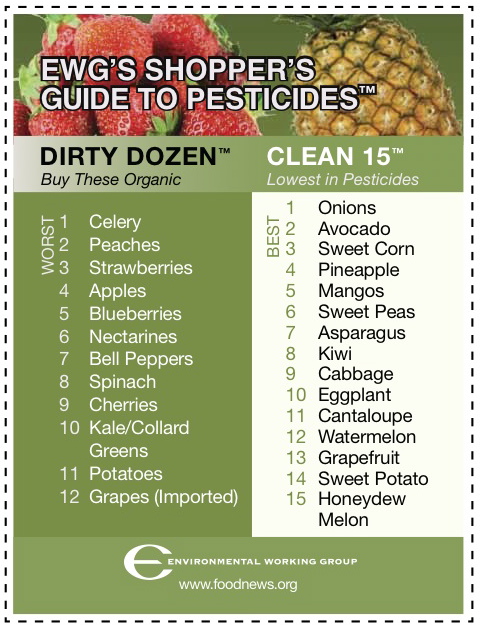 The word organic can be intimidating. Perhaps because it is in a special section, or because it can be more expensive or because we don't understand the difference.
The word organic can be intimidating. Perhaps because it is in a special section, or because it can be more expensive or because we don't understand the difference.What does Organic mean? “Simply stated, organic produce and other ingredients are grown without the use of pesticides, synthetic fertilizers, sewage sludge, genetically modified organisms, or ionizing radiation.” (Organic.org)
Knowing the difference between the Organic and Commercially grow/raised products your family consumes will make a huge difference in your health. The growing consensus amoung scientists is that small doses of pesticides and other chemicals can cause lasting damage to human health, especially during fetal development and early childhood. Scientists now know enough about the long-term consequences of ingesting these powerful chemicals to advise that we minimize our consumption of pesticides. (Maximized Living Nutrition Plans)
The world wide debate about conventional farmering practaces are getting a lot of attention and studies will continue to come out linking the pesticides, additives, preservatives, growth hormones and genetic modifications to serious health disorders and diseaseas. Althougth as a society we do value science and research I think common sence and knowledge of what is going on with our food before it hits our table can teach us so much.
"The health of the people is dependent upon the quality of the food they consume. And the quality of their foods depends on the quality of the soil on which that food is grown."
-Jerome I. Rodale (founder of Rodale Press and Prevention Magazine)

Conventional farming practices see the soil as a means to an end. ... soils are used and used and nutrients are drawn out of the soil rendering them as new deserts. Farmers are then forced to periodically saturate their crops with unnatural chemical fertilizers. These fertilizers however are made up of primarily 3 nutrients N, P, K, (Nitrogen, Phosphorus and Potassium), but as Charlotte Gerson in Food Matters asks, "Where are the rest of the 52 minerals needed for optimum soil health? They are missing!"So poor soil health is leading to poor plant health and when plants are deficient they lose their defences and then the bugs come. Then the farmers need deadly toxins like pesticides, herbicides and fungicides. FoodMatters.tv
Poor soil health, poor plant health... our food supply is becoming deficient and toxic leading to our bodies becoming deficient and toxic. Over the short term these vitamin and mineral deficiencies combined with an increased toxicity can manifest themselves as thousands of ailments. Over the long term these deficiencies contribute to major illnesses such as cancer, heart disease, diabetes and mental Illness.
What’s the Difference?
The Enviormental Working Group research has found that people who eat the twelve most contaminated fruits and vegetables consume an average of ten pesticides a day. Those who eat the fifteen least contaminated conventionally-grown fruits and vegetables ingest fewer than two pesticides daily. The Guide helps consumers make informed choices to lower their dietary pesticide load. (Maximized Living Nutrition Plans)
The Enviornmental Working Group in Washington,D.C., has developed the Shopper’s Guide to Pesticides based on data from nearly 87,000 tests for pesticide residues in produce collected by the USDA and the FDA.
TIP: If it is not possible to purchase all organic produce, focus on purchasing produce with a high pesticide load (Dirty Dozen) organic.
These lists are updated yearly by the Enviornmental Working Group (www.ewg.org) and can be found at www.foodnews.org. This web site will give you the full list of pesticide loads.

No comments:
Post a Comment